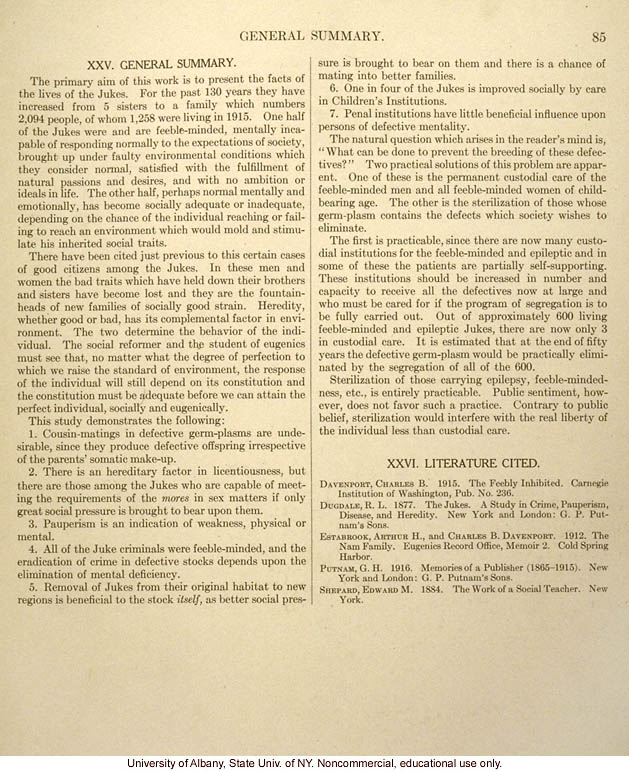The Jukes in 1915, by Arthur H. Estabrook, selected pages (13)

The Jukes in 1915, by Arthur H. Estabrook, selected pages (13)
1382. GENERAL SUMMARY. 85 XXV. General Summary. The primary aim of this work is to present the facts of the lives of the Jukes. For the past 130 years they have increased from 5 sisters to a family which numbers 2,094 people, of whom 1,258 were living in 1915. One half of the Jukes were and are feeble-minded, mentally incapable of responding normally to the expectations of society, brought up under faulty environmental conditions which they consider normal, satisfied with the fulfillment of natural passions and desires, and with no ambition or ideals in life. The other half, perhaps normal mentally and emotionally, has become socially adequate or inadequate, depending on the chance of the individual reaching or failing to reach an environment which would mold and stimulate his inherited social traits. There have been cited just previous to this certain cases of good citizens among the Jukes. In these men and women the bad traits which have held down their brothers and sisters have become lost and they are the fountain-heads of new families of socially good strain. Heredity, whether good or bad, has its complemental factor in environment. The two determine the behavior of the individual. The social reformer and the student of eugenics must see that, no matter what the degree of perfection to which we raise the standard of environment, the response of the individual will still depend on its constitution and the constitution must be adequate before we can attain the perfect individual, socially and eugenically. This study demonstrates the following: 1. Cousin-matings in defective germ-plasms are undesirable, since they produce defective offspring irrespective of the parents' somatic make-up. 2. There is an hereditary factor in licentiousness, but there are those among the Jukes who are capable of meeting the requirements of the [begin italics]mores[end italics] in sex matters if only great social pressure is brought to bear upon them. 3. Pauperism is an indication of weakness, physical or mental. 4. All of the Juke criminals were feeble-minded, and the eradication of crime in defective stocks depends upon the elimination of mental deficiency. 5. Removal of Jukes from their original habitat to new regions is beneficial to the stock [begin italics]itself[end italics], as better social pressure is brought to bear upon them and there is a chance of mating into better families. 6. One in four of the Jukes is improved socially by care in Children's Institutions. 7. Penal institutions have little beneficial influence upon persons of defective mentality. The natural question which arises in the reader's mind is, "What can be done to prevent the breeding of these defectives?" Two practical solutions of this problem are apparent. One of these if the permanent custodial care of the feeble-minded men and all feeble-minded women of child-bearing age. The other is the sterilization of those whose germ-plasm contains the defects which society wishes to eliminate. The first is practicable, since there are now many custodial institutions for the feeble-minded and epileptic and in some of these the patients are partially self-supporting. These institutions should be increased in number and capacity to receive all the defectives now at large and who must be cared for if the program of segregation is to be fully carried out. Out of approximately 600 living feeble-minded and epileptic Jukes, there are now only 3 in custodial care. It is estimated that at the end of fifty years the defective germ-plasm would be practically eliminated by the segregation of all of the 600. Sterilization of those carrying epilepsy, feeble-mindedness, etc., is entirely practicable. Public sentiment, however, does not favor such a practice. Contrary to public belief, sterilization would interfere with the real liberty of the individual less than custodial care. XXVI. Literature Cited. Davenport, Charles B. 1915. The Feebly Inhibited. Carnegie Institution of Washington, Pub. No. 236. Dugdale, R. L. 1877. The Jukes. A Study in Crime, Pauperism, Disease, and Heredity, New York and London: G. P. Putnam's Sons. Estabrook, Arthur H., and Charles B. Davenport. 1912. The Nam Family. Eugenics Record Office, Memoir 2. Cold Spring Harbor. Putnam, G. H. 1916. Memories of a Publisher (1865-1915). New York and London: G. P. Putnam's Sons. Shepard, Edward M. 1884. The Work of a Social Teacher. New York. [end]
- ID: 11346
- Source: DNALC.EA


